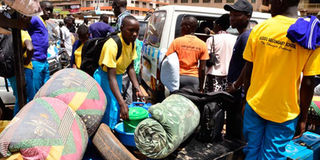Are schools favouring the rich?

School time. Students struggling to get transport back to school.
What you need to know:
- The last two-three years have been a nightmare for most families due to bad weather that destroyed crops and animals in many areas.
- When a group of people fail to cross the border lying between their comfort zones and the world of the poor, they are bound to make prescriptions, which fall short of addressing the real issues.
When Lwengo District councillors passed a by-law last week to punish all parents who fail to pack lunch for their school-going children, I knew that the rest of the country would soon follow suit.
As I have argued before, it is an excellent idea to provide lunch for children at school to improve their concentration in the class.
However, for most rural families, this is an impossibility caused by a myriad of challenges.
For example, the last two-three years have been a nightmare for most families due to bad weather that destroyed crops and animals in many areas. This has combined with the ever-rising population to cause continual decline both in soil quality and acreage devoted to food production.
There have also been pests that farmers had to deal with. Do we want to believe that in such circumstances poor parents can have enough food for children with some left for the rest of the family?
Two questions beg answers here. Why do people who live in Uganda fail to know that there is massive rural poverty and continue to come up with punitive measures that disadvantage the poor?
Why do leaders fail to realise that they do not love poor children more than their biological parents do?
Paulo Freire, the distinguished Brazilian philosopher and adult educator has the answers in his book titled Pedagogy Of The Oppressed. When a group of people fail to cross the border lying between their comfort zones and the world of the poor, they are bound to make prescriptions, which fall short of addressing the real issues.
This results from the failure to understand the lived experience of the poor and how they cope with an unjust world, which has pushed them to the margins of society.
Accordingly, parents are seen as a group that does not appreciate the available education opportunities and instead choose to block the future of children by denying them food. Therefore, they must take the blame, not the system, for the low academic performance of their children.
The remedy often offered is not only to ‘sensitise’ them, but also to bring them to order through legislation.
[email protected]




